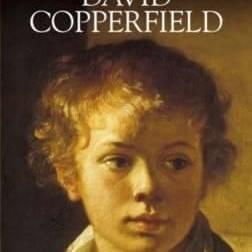
DAVID COPPERFIELD (CHAP. 46) Charles Dickens
На этой странице вы найдете полный текст песни "DAVID COPPERFIELD (CHAP. 46)" от Charles Dickens. Lyrxo предлагает вам самый полный и точный текст этой композиции без лишних отвлекающих факторов. Узнайте все куплеты и припев, чтобы лучше понять любимую песню и насладиться ею в полной мере. Идеально для фанатов и всех, кто ценит качественную музыку.

CHAPTER 46. INTELLIGENCE
I must have been married, if I may trust to my imperfect memory for dates, about a year or so, when one evening, as I was returning from a solitary walk, thinking of the book I was then writing—for my success had steadily increased with my steady application, and I was engaged at that time upon my first work of fiction—I came past Mrs. Steerforth's house. I had often passed it before, during my residence in that neighbourhood, though never when I could choose another road. Howbeit, it did sometimes happen that it was not easy to find another, without making a long circuit; and so I had passed that way, upon the whole, pretty often.
I had never done more than glance at the house, as I went by with a quickened step. It had been uniformly gloomy and dull. None of the best rooms abutted on the road; and the narrow, heavily-framed old-fashioned windows, never cheerful under any circumstances, looked very dismal, close shut, and with their blinds always drawn down. There was a covered way across a little paved court, to an entrance that was never used; and there was one round staircase window, at odds with all the rest, and the only one unshaded by a blind, which had the same unoccupied blank look. I do not remember that I ever saw a light in all the house. If I had been a casual passer-by, I should have probably supposed that some childless person lay dead in it. If I had happily possessed no knowledge of the place, and had seen it often in that changeless state, I should have pleased my fancy with many ingenious speculations, I dare say.
As it was, I thought as little of it as I might. But my mind could not go by it and leave it, as my body did; and it usually awakened a long train of meditations. Coming before me, on this particular evening that I mention, mingled with the childish recollections and later fancies, the ghosts of half-formed hopes, the broken shadows of disappointments dimly seen and understood, the blending of experience and imagination, incidental to the occupation with which my thoughts had been busy, it was more than commonly suggestive. I fell into a brown study as I walked on, and a voice at my side made me start.
It was a woman's voice, too. I was not long in recollecting Mrs. Steerforth's little parlour-maid, who had formerly worn blue ribbons in her cap. She had taken them out now, to adapt herself, I suppose, to the altered character of the house; and wore but one or two disconsolate bows of sober brown.
'If you please, sir, would you have the goodness to walk in, and speak to Miss Dartle?'
'Has Miss Dartle sent you for me?' I inquired.
'Not tonight, sir, but it's just the same. Miss Dartle saw you pass a night or two ago; and I was to sit at work on the staircase, and when I saw you pass again, to ask you to step in and speak to her.'
I turned back, and inquired of my conductor, as we went along, how Mrs. Steerforth was. She said her lady was but poorly, and kept her own room a good deal.
When we arrived at the house, I was directed to Miss Dartle in the garden, and left to make my presence known to her myself. She was sitting on a seat at one end of a kind of terrace, overlooking the great city. It was a sombre evening, with a lurid light in the sky; and as I saw the prospect scowling in the distance, with here and there some larger object starting up into the sullen glare, I fancied it was no inapt companion to the memory of this fierce woman.
She saw me as I advanced, and rose for a moment to receive me. I thought her, then, still more colourless and thin than when I had seen her last; the flashing eyes still brighter, and the scar still plainer.
Our meeting was not cordial. We had parted angrily on the last occasion; and there was an air of disdain about her, which she took no pains to conceal.
'I am told you wish to speak to me, Miss Dartle,' said I, standing near her, with my hand upon the back of the seat, and declining her gesture of invitation to sit down.
Комментарии (0)
Минимальная длина комментария — 50 символов.












